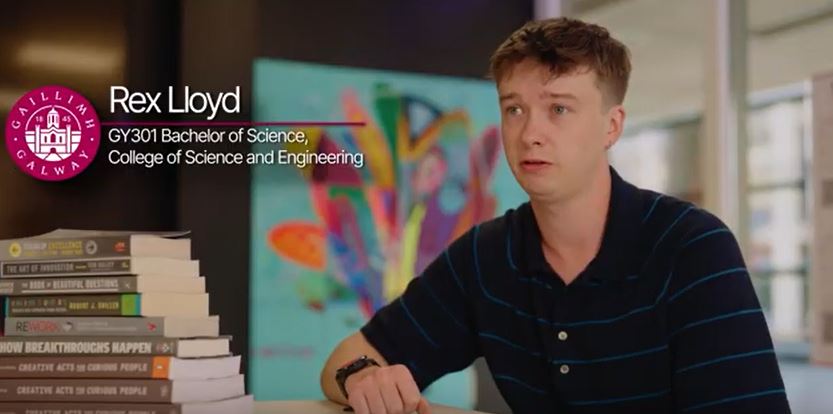-
Courses

Courses
Choosing a course is one of the most important decisions you'll ever make! View our courses and see what our students and lecturers have to say about the courses you are interested in at the links below.
-
University Life

University Life
Each year more than 4,000 choose University of Galway as their University of choice. Find out what life at University of Galway is all about here.
-
About University of Galway

About University of Galway
Since 1845, University of Galway has been sharing the highest quality teaching and research with Ireland and the world. Find out what makes our University so special – from our distinguished history to the latest news and campus developments.
-
Colleges & Schools

Colleges & Schools
University of Galway has earned international recognition as a research-led university with a commitment to top quality teaching across a range of key areas of expertise.
-
Research & Innovation

Research & Innovation
University of Galway’s vibrant research community take on some of the most pressing challenges of our times.
-
Business & Industry

Guiding Breakthrough Research at University of Galway
We explore and facilitate commercial opportunities for the research community at University of Galway, as well as facilitating industry partnership.
-
Alumni & Friends

Alumni & Friends
There are 128,000 University of Galway alumni worldwide. Stay connected to your alumni community! Join our social networks and update your details online.
-
Community Engagement

Community Engagement
At University of Galway, we believe that the best learning takes place when you apply what you learn in a real world context. That's why many of our courses include work placements or community projects.
Bachelor of Science
Course Overview
The GY301 Bachelor of Science degree programme allows you to take a variety of subjects in Science before you decide which scientific area to specialise in for your four-year honours degree. It is the ideal choice for students who are interested in several areas of science and who want the flexibility to explore their scientific interests further before committing to a particular specialism.
The programme provides a solid foundation in Science subjects in the first year, with module offerings in Biology, Chemistry, Physics, Mathematics, Mathematical Studies, Computing and Applied Mathematics.
Progressing into second and third year you can choose from a wide range of 20 different specialties, referred to as pathways, including Chemistry, Medicinal Chemistry, Biochemistry, Microbiology, Plant and AgriBiosciences, Botany and Plant Science, Zoology, Earth and Ocean Sciences, Physics and Applied Physics, Physics and Climate Physics, Mathematics, Applied Mathematics, Computing, Data Science, Anatomy, Physiology, Pharmacology.
You can study up to three of those pathways in Year 2, continuing with up to two pathways in Year 3, before choosing a single specialism for Year 4 of the programme, giving flexibility to discover your unique interests and build a tailored skillset that will lead you onto your scientific specialism. To ensure quality in student experience, places in some pathways are limited, a quota system applies to pathways in Year 2.
The pathways are designed and delivered by research-active lecturers and thus incorporate course content inspired by current research trends, including public policy and industry partnership, whilst emphasising the importance of science communication. Our curricula embed sustainability and the principles of the UN’s Sustainable Development Goals, feature innovative teaching methods, and draw on our wide range of strengths from across the sciences at University of Galway.
Applications and Selections
Who Teaches this Course
Requirements and Assessment
Key Facts
Entry Requirements
Minimum Grade H5 in two subjects and passes in four other subjects at O6/H7 level in the Leaving Certificate, including Irish, English, Mathematics, a laboratory science subject (i.e. Chemistry, Physics, Biology, Physics with Chemistry (joint) or Agricultural Science) and any two other subjects recognised for entry purposes.
Additional Requirements
Recognition of Prior Learning (RPL)
Duration
4 years
Next start date
September 2025
A Level Grades (2024)
universityofgalway.ie/alevels
Average intake
300
QQI/FET FETAC Entry Routes
30 (More Info)
Closing Date
NFQ level
Mode of study
ECTS weighting
Award
CAO
GY301
Course code
Course Outline
In each year of the programme a student studies modules to a total of 60 Credits.
Year 1
A student chooses four 15-credit modules from the following:
- Biology BO101
- Chemistry CH101
- Physics PH101
- Mathematics (Honours) MA180
- Mathematical Studies MA161
- Applied Mathematics MP180
- Computer Science CS102
Each Year 1 module is available to each student of the GY301 Bachelor of Science programme, with no limits on places, with only the constraint that students must choose at least one module from: MA180, MA161 or MP180. Only one of MA180 (tailored for students who may wish to consider a degree specialism in mathematics or data science) and MA161 (which guides students in analytic skills required for scientists) may be taken. The combination of modules chosen in Year 1 will be important as requirements in selecting focused pathways of study from Year 2. First year students will have an advisory session to aid in module selection, and further information and guidance can be found in the 1st year student handbook.
Year 1 modules are supported by lectures, which provide discussion and demonstration of topics, by tutorials or workshops, and by practical classes offering extensive and hands-on laboratory experience. Students are supported by the CÉIM shared peer learning initiative, by the SUMS Centre (Support for Undergraduate Mathematics and Statistics) and an Advisory Scheme in which each student has a contact point with an academic staff member to help answer general queries throughout their first year.
Year 2
In Year 2 of the programme students begin a specialised path of study. Modules are grouped by focused themes providing a pathway toward a specialism. Students can study up to three pathways in Year 2, where eligibility for the pathways depends on the combination of modules chosen in Year 1. Note that places on some pathways are limited – advisory sessions are provided, during which pathway advisors will be available to discuss module options.
Years 3 and 4
In year 3 of the programme students continue their focused paths of study, retaining up to two pathways, choosing a single specialism in either Year 3 or Year 4. In Year 4 - the final year - students study advanced modules and undertake an intensive research project in their chosen area guided by an academic supervisor, leading to their specialist Bachelor of Science degree.
Pathways:
Pathways Years 2-4:
• Anatomy
• Applied Mathematics
• Biochemistry
• Botany and Plant Science
• Chemistry
• Computing
• Data Science
• Earth and Ocean Sciences
• Mathematics
• Mathematics and Applied Mathematics
• Mathematical Studies and Computing
• Mathematics and Computing
• Medicinal Chemistry
• Microbiology
• Pharmacology
• Physics and Applied Physics
• Physics and Climate Physics
• Physiology
• Plant and AgriBiosciences
• Zoology
More details on the pathway offerings, structures, and registration directions can be found in the Course Outline for GY301 Bachelor of Science here.
Curriculum Information
Curriculum information relates to the current academic year (in most cases).Course and module offerings and details may be subject to change.
Glossary of Terms
- Credits
- You must earn a defined number of credits (aka ECTS) to complete each year of your course. You do this by taking all of its required modules as well as the correct number of optional modules to obtain that year's total number of credits.
- Module
- An examinable portion of a subject or course, for which you attend lectures and/or tutorials and carry out assignments. E.g. Algebra and Calculus could be modules within the subject Mathematics. Each module has a unique module code eg. MA140.
- Subject
- Some courses allow you to choose subjects, where related modules are grouped together. Subjects have their own required number of credits, so you must take all that subject's required modules and may also need to obtain the remainder of the subject's total credits by choosing from its available optional modules.
- Optional
- A module you may choose to study.
- Required
- A module that you must study if you choose this course (or subject).
- Required Core Subject
- A subject you must study because it's integral to that course.
- Semester
- Most courses have 2 semesters (aka terms) per year, so a three-year course will have six semesters in total. For clarity, this page will refer to the first semester of year 2 as 'Semester 3'.
Year 1 (60 Credits)
OptionalBO101: Biology - 15 Credits - Semester 1OptionalMA161: Mathematical Studies - 15 Credits - Semester 1
OptionalMA180: Mathematics (Honours) - 15 Credits - Semester 1
OptionalPH101: Physics - 15 Credits - Semester 1
OptionalCH101: Chemistry - 15 Credits - Semester 1
OptionalMP180: Applied Mathematics - 15 Credits - Semester 1
OptionalCS102: Computer Science - 15 Credits - Semester 1
Year 2 (60 Credits)
OptionalCH2101: Medicinal Chemistry - 5 Credits - Semester 3OptionalGR353: German - 10 Credits - Semester 3
OptionalGR252: German - 10 Credits - Semester 3
OptionalGR224: Beginner's German for Science - 10 Credits - Semester 3
OptionalBO2101: Scientific Writing Skills - 5 Credits - Semester 3
OptionalMI202: Laboratory Skills in Microbiology I - 5 Credits - Semester 3
OptionalBPS202: Fundamentals in Aquatic Plant Science - 5 Credits - Semester 3
OptionalPM209: Applied Concepts in Pharmacology - 5 Credits - Semester 3
OptionalPM208: Fundamental Concepts in Pharmacology - 5 Credits - Semester 3
OptionalCT2101: Object Oriented Programming I - 5 Credits - Semester 3
OptionalLN2210: Scileanna Gaeilge don Eolaíocht 1 - 5 Credits - Semester 3
OptionalEOS213: Introduction to Ocean Science - 10 Credits - Semester 3
OptionalMA2286: Differential Forms - 5 Credits - Semester 3
OptionalAN2101: Cells and Tissues - 10 Credits - Semester 3
OptionalBO201: Molecular and Cellular Biology - 5 Credits - Semester 3
OptionalBI208: Protein Structure and Function - 5 Credits - Semester 3
OptionalMP236: Mechanics I - 5 Credits - Semester 3
OptionalMP231: Mathematical Methods I - 5 Credits - Semester 3
OptionalBO202: Evolution and the Tree of Life - 5 Credits - Semester 3
OptionalCH203: Physical Chemistry - 5 Credits - Semester 3
OptionalMA284: Discrete Mathematics - 5 Credits - Semester 3
OptionalMA211: Calculus I - 5 Credits - Semester 3
OptionalMA215: Mathematical Molecular Biology I - 5 Credits - Semester 3
OptionalCH204: Inorganic Chemistry - 5 Credits - Semester 3
OptionalCS2101: Programming for Science and Finance - 5 Credits - Semester 3
OptionalST1111: Probability Models - 5 Credits - Semester 3
OptionalST2001: Statistics for Data Science 1 - 5 Credits - Semester 3
OptionalBSS2103: Introduction to Sustainability 1 - 5 Credits - Semester 3
OptionalMG3113: Megatrends - 5 Credits - Semester 3
OptionalPS3108: Design Thinking - 5 Credits - Semester 3
OptionalED2103: Design Your Life - 5 Credits - Semester 3
OptionalZO2101: Entomology - 5 Credits - Semester 3
OptionalBI3103: Career Development and Employability Skills - 5 Credits - Semester 3
OptionalSI2101: Introductory Physiology - 10 Credits - Semester 3
OptionalPS3123: Exploring Routes to Wellbeing - 5 Credits - Semester 4
OptionalPH2111: Makerspace Creative Technologies 1 - 5 Credits - Semester 3
OptionalPH2113: Energy, Forces and Motion in Physics - 5 Credits - Semester 3
OptionalPH2114: Modern Physics - 5 Credits - Semester 3
OptionalPH2108: Scaling Big Ideas - 5 Credits - Semester 4
OptionalMG3117: Intercultural Encounters - 5 Credits - Semester 4
OptionalMA1993: Mathematics Of Finance - 5 Credits - Semester 4
OptionalCS211: Programming and Operating Systems - 5 Credits - Semester 4
OptionalMI204: Microbes and the Environment - 5 Credits - Semester 4
OptionalAN226: Systems Histology - 5 Credits - Semester 4
OptionalMA283: Linear Algebra - 5 Credits - Semester 4
OptionalCH202: Organic Chemistry - 5 Credits - Semester 4
OptionalCT2102: Object Oriented Programming II - 5 Credits - Semester 4
OptionalLN2211: Scileanna Gaeilge don Eolaíocht 2 - 5 Credits - Semester 4
OptionalPAB2101: AgriBiosciences - 5 Credits - Semester 4
OptionalMA2287: Complex Analysis - 5 Credits - Semester 4
OptionalMP237: Mechanics II - 5 Credits - Semester 4
OptionalBI207: Metabolism and Cell Signalling - 5 Credits - Semester 4
OptionalBI206: Gene Technologies and Molecular Medicine - 5 Credits - Semester 4
OptionalFR252: French - 10 Credits - Semester 4
OptionalMP232: Mathematical Methods II - 5 Credits - Semester 4
OptionalZO209: Vertebrate Zoology - 5 Credits - Semester 4
OptionalZO208: Invertebrate Biology - 5 Credits - Semester 4
OptionalMI203: Laboratory Skills in Microbiology II - 5 Credits - Semester 4
OptionalBPS203: Plant Diversity, Physiology & Adaptation - 5 Credits - Semester 4
OptionalPM210: Molecular Pharmacology and Signalling - 10 Credits - Semester 4
OptionalAN223: Embryology & Development - 5 Credits - Semester 4
OptionalMA212: Calculus II - 5 Credits - Semester 4
OptionalMA216: Mathematical Molecular Biology II - 5 Credits - Semester 4
OptionalCH205: Analytical & Environmental Chemistry - 5 Credits - Semester 4
OptionalEOS2102: The Earth: From Core to Crust - 10 Credits - Semester 4
OptionalST1112: Statistical Methods - 5 Credits - Semester 4
OptionalST2002: Statistics for Data Science 2 - 5 Credits - Semester 4
OptionalBSS2104: Introduction to Sustainability 2 - 5 Credits - Semester 4
OptionalMG3115: Megatrends - 5 Credits - Semester 4
OptionalED2104: Design Your Life Semester 2 - 5 Credits - Semester 4
OptionalSI2102: Systems Physiology - 10 Credits - Semester 4
OptionalMA2104: Matamaitic don Inbhuanaitheacht (Mathematics for Sustainability) - 5 Credits - Semester 4
OptionalSP3211: Empathy in Action - 5 Credits - Semester 4
OptionalPH2112: Makerspace Creative Technologies 2 - 5 Credits - Semester 4
OptionalPH2115: Electricity and Magnetism - 5 Credits - Semester 4
OptionalPH2116: Computational Physics - 5 Credits - Semester 4
Further Education
After completing your BSc Science Programme, University of Galway offers a range of further education opportunities, including Higher Diplomas, Taught and Research Masters programmes, and PhD Fellowships. Information on graduate programmes on offer can be located within the School webpage or Research Centre webpage as relevant to the degree pathway specialism chosen within the programme.
Some careers of past graduates include:
- Medical Devices
- Biotechnology Research and Development
- Biodiversity Specialist
- National Parks and Wildlife Service (NPWS)
- Senior Inspector, Environmental Protection Agency (EPA)
- Meteorologist, Met Eireann
- Climate Scientist
- Curator of Astronomy & Modern Physics, Science Museum, London
- Astronomer
- Laser Physicist
- Medical Physicist
- Renewable Energy Researcher
- Oil Explorer
- Marine Environmental Monitoring Services, Marine Institute
- Quality Technician
- Pharmaceuticals
- Forensic Science
- Infectious Diseases and Environmental Microbiology
- Cancer Research
- Dietician
- Functional Ecologist, Teagasc
- Food Safety Authority, Teagasc
- Design Engineer
- Statistician
- Data Scientist
- Software Developer
- Quantitative Analyst, Mathematical Modelling
- Science Education; Second-level Science Teacher, Science Education Researcher, Lecturer.
- Quality Engineer
- Science Communicator
Why Choose This Course?
Career Opportunities
University of Galway is a research-intensive university, where our teaching is inspired by our global research impact.
On the completion of your degree, as a University of Galway Bachelor of Science graduate you will be equipped with the scientific knowledge and methods, creative problem-solving aptitude and innovation ability required to foster lifelong critical thinking.
Modules and pathways are designed to instill scientific techniques, transferrable skills, and the ability to work equally well individually or in teams. These skills are essential for any career orientated towards research and development (R&D) as well as many other professional careers in industrial, academic and public sectors.
The GY301 Bachelor of Science programme is a degree that will empower you to join the next generation of graduates who will face and solve some of the challenges of our changing world, from mitigating against irreversible climate change, meeting the world’s food and energy demands or developing knowledge and technology to protect the health of society and the environment.
Who’s Suited to This Course
Learning Outcomes
Transferable Skills Employers Value
Work Placement
Study Abroad
Related Student Organisations
Course Fees
Fees: EU
Fees: Tuition
Fees: Student Contribution
Fees: Student levy
Fees: Non EU
EU Fees are comprised of Tuition + Student Contribution Charge + Student Levy* €140. *Payable by all students and is not covered by SUSI. Further detail here.
For 25/26 entrants, where the course duration is greater than 1 year, there is an inflationary increase approved of 3.4% per annum for continuing years fees**.
**Excludes Full-Time EU Undergraduate fees. These are fixed and do not change.
Find out More
The College of Science and Engineering
E science-engineering@universityofgalway.ie
https://www.universityofgalway.ie/science-engineering/
What Our Students Say

Rachel Cleary | QUALITY TECHNICIAN, CLS
Not knowing which discipline of Science I wanted to pursue, I chose the Bachelor of Science Degree at University of Galway, which offers a basis for fundamental science and a broad foundation for which to specialise upon. I found my feet within the biochemistry department, where lectures and practicals were in-depth, informative and gave me the experience and analytical skills required for my job today. In my Final year project I spent half the year immersed in Laboratory life, where I gained skills in analytical techniques, time management and teamwork, which I felt prepared me for industry. I started working for a laboratory solutions company soon after my degree, and they placed me on contract within a global pharmaceutical company. Here I work within the quality laboratory, using techniques such as High Performance Liquid Chromatography which I first learned at University of Galway.

















